For perfecting the art/craft of musical writing, there is only one program that is free, weekly, ongoing, and can boast famous graduates like Alan Menken, Ahrens and Flaherty, and Kristen and Robert Lopez. That is the BMI Musical Theatre Workshop created in 1961. Its first director was Lehman Engel who recognized that emerging writers could nurture their talents under the guidance of master writers.
The Three Levels of the BMI Musical Theatre Workshop
The BMI Musical Theatre Workshop now has three levels: First Year that meets Mondays at 6:15 p.m., Second Year that meets Tuesdays at 5:30 p.m, and Advanced that meets Mondays at 4:00 p.m. Applications for the highly selective admissions process are accepted once a year and with those deadlines approaching, it’s a good time to explore what the workshop offers. While the workshop sessions are held in New York City at BMI’s headquarters at 7 World Trade Center, out-of-towners may participate by traveling to NYC for the one night per week.
Composers and lyricists must apply by August 1 and Librettists by June 1. https://www.bmi.com/theatre_workshop
Every year, a handful of recently written songs are selected for a public showcase such as the one I attended April 1. The performances from fourteen writing teams ranged from touching solos like “Back to My Arms” from #Mars to wildly funny numbers like “Close Your Eyes,” from Holy Crap: The Worst Parts of the Bible, all displaying well-tooled talents of composers and lyricists. I spoke afterward with the writers of those two songs and collected additional information about the workshop.
What’s it Like? Comments from Insiders
Laura Kleinbaum’s and Willem Oosthuysen’s #Mars is one of several musicals the collaborators have worked on as part of the BMI Musical Theatre Workshop. Kleinbaum joined the Workshop after completing the Graduate Musical Theatre Writing program at NYU Tisch in 2012. “At NYU we focused a lot on bookwriting and making the whole musical, but at BMI we focus on songwriting.” She says she joined BMI to continue studying and also meet a new group of cohorts. As Kleinbaum explains, in the first year of the program, lyricists and composers work with different writers on songs and completing a 10-minute musical. In the second year of the program, students find or are matched with one partner to adapt a piece together throughout the year. The presentation of that musical becomes the audition for the Advanced Workshop.
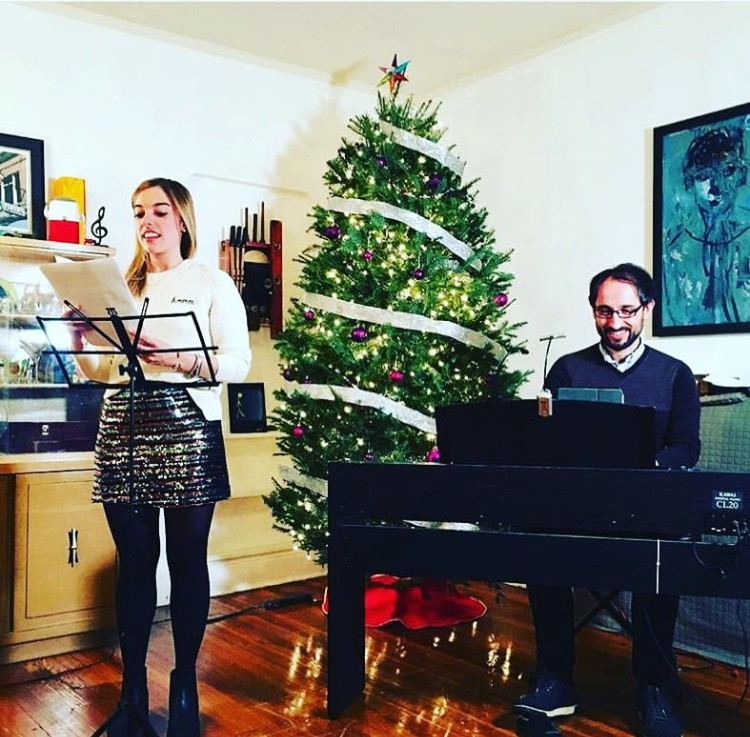
BMI collaborators Laura Kleinbaum and Willem Oosthuysen at a holiday salon that other writers from the workshop put on once a year. Kleinbaum says, “It raises money for a charity, plus we all get to write holiday songs and share them while drinking–very fun!”
By now she and Willem are in the Advanced Workshop. Describing some of the benefits, she says, “You get exposure and you also get constant deadlines and somewhere to show off your work. And you get a roomful of really smart people giving you feedback, so you’re not writing in a vacuum. In the Advanced Workshop you don’t have to go every week; you can just go whenever you want, but it’s better to go often.” She continues:
I love the program; also, it’s free so if you can find the time then it’s really helpful. Lots of Broadway writers went through it. In the Advanced Workshop, a lot of the alums moderate. So you’ll come in, and someone like Lynn Ahrens will give you advice on your musical, or Richard Maltby, so that’s helpful too.
~Laura Kleinbaum
BMI Collaboration and Comedy
The comedy in Daniel Israel’s and Phoebe Kreutz’s show Holy Crap: The Worst Parts of the Bible is based in part on the use of contemporary language and approaches to the Bible. As Kreutz explains, “It’s really not our intention with the show to be unfriendly about the Bible; it’s just saying if we’re going to be making laws and policy based on the Bible let’s look at the whole Bible.” Israel adds, “People who are coming to Holy Crap…. we hope that they know what they are getting themselves into” so the humor won’t be unexpected.
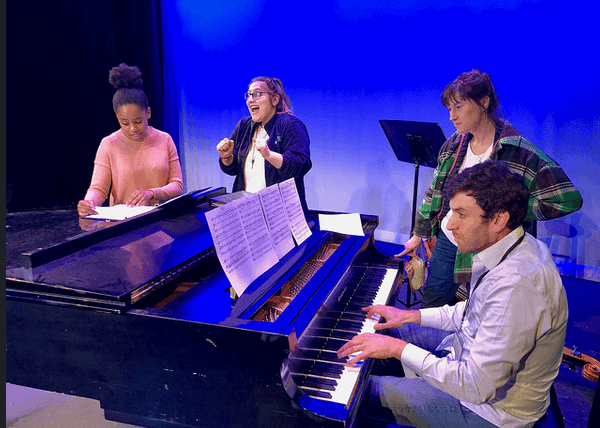
Showcase rehearsal photo by Adam Mathias. Pictured are singers Kim Onah and Yael Rizowy; writers Phoebe Kreutz and Daniel Israel.
Daniel Israel was in his second year at the BMI Musical Theatre Workshop when he was matched up by one of the moderators with Phoebe Kreutz who was already in the Advanced Workshop. Kreutz’s former writing partner had moved far away so she needed a new pairing. Even now in their twelfth year of collaboration they say it can be nerve-wracking to expose a new piece to a group of 40 or 50 people in the room, but they realize the value. Kreutz emphasizes, “Especially doing comedy—you really don’t know if it works at all until you get it in front of an audience, and so just getting to hear some laughs (or no laughs) really lets you know if you’re on the right track or not.”
They also both find deadlines are helpful. When asked if they are ever worried their creativity won’t come through, they say something usually comes before the deadline. “You just power through,” says Kreutz. He continues:
“Not every single song is going to be a slam dunk, and that’s part of what makes the BMI room great. It’s a safe space to try something out. No one is going to say you’re a talentless hack….”
~Phoebe Kreutz
Getting Accepted to the BMI Musical Theatre Workshop
The first decision is whether or not this is for you. As Israel says:
“It takes a certain kind of person to make yourself be vulnerable for the critique and criticism that comes with the program. Not everyone is cut out for that.”
~Daniel Israel
Tips on Applying
For those ready to apply, Israel and Kreutz had advice.
Israel: “For the application, my advice as a composer is, just be yourself. They will determine whether or not you can really do x, y, z.”
Kreutz: “It’s a marriage between having an originality of voice so you don’t sound like you’re trying to be everybody else, but then also somebody who doesn’t seem that they’re resistant to the process. The program is rigorous, especially those first couple of years where you have assignments and you’re expected to show up, you’re expected to tell a story in a very coherent and pretty formulaic way, and can you make that formula fresh? That’s what they are looking for. I think they are looking for people who are perfectionists. Because musical writing is somewhere between an art and a craft, I think they want somebody who is a crazy artist who also can sit down and get the hard work done.”
Patrick Cook, who administrates the program, explains that out of about 300 applicants for the songwriter workshop (composers/lyricists), about 35 get into the first year program. A handful of applicants who didn’t make the workshop cut are invited to audit. The librettists program is more challenging to enter because it’s ongoing (not divided between years).
No Guarantee of a Production, But….
BMI’s focus is on writing and not on how to get a musical produced. Composer-lyricist Noel Katz, who also contributes to Musicalwriters.com, was an early graduate of BMI. I asked him if the intense focus on musical writing craft might actually hold participants back from efforts to get musicals produced. Might they be more inclined to work on musicals that were less commercial? He replied, “What makes a musical commercial is a variety of factors, related to money. The BMI Musical Theatre Workshop doesn’t teach networking, or perfecting an Elevator Pitch to a potential producer. It’s been my experience that the shows I work on that seem like the most commercial ideas are the ones that go nowhere. My getting 19 different shows on the boards had to do with getting to know people who knew my work well enough to want to do something with me. None of these were at BMI.”
For getting a show in front of audiences, websites and other programs can be helpful, such as this MusicalWriters.com open site (for education and tips) or the MusicalWriters Mainstage membership (for networking, additional tools and developmental assistance), or with organizations like TRU (TRUonline) or NMI. But BMI is catching up in this regard as well. The leaders have strengthened the networking options through showcases and recommendations. Mr. Cook notes that he is frequently contacted “to recommend writing teams for shows, and more than a few Workshop members have gotten their agents through BMI.”
Primarily, the program’s focus is still the hard work of developing skills for writing musicals. As Alan Menken remarks in the notes on the BMI website:
We encourage Workshop members to experiment and take risks. That was Lehman’s credo. He told us to go for it, to try for the new and unusual, to make that extra effort to do work that is worthy of attention. What he said still goes. The musical theatre remains a highly receptive medium for good and original work. Certainly, you can easily take more risks in the Workshop, without a multimillion-dollar budget hanging over you.
~Alan Menken
BMI Musical Theatre Workshop Typical Deadlines
- Composers/Lyricists: August 1.
- Librettists: June 1.
For more information, visit https://www.bmi.com/theatre_workshop/application_requirements

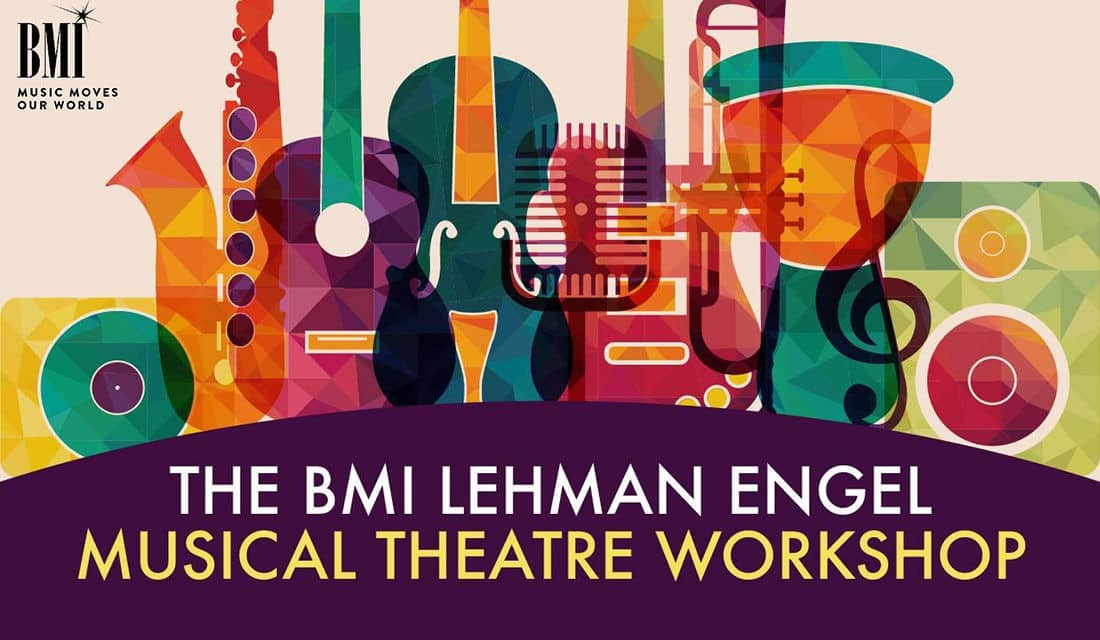


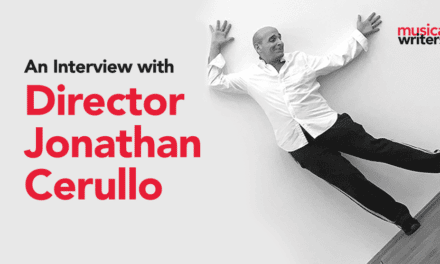
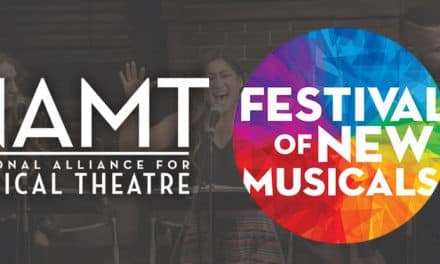











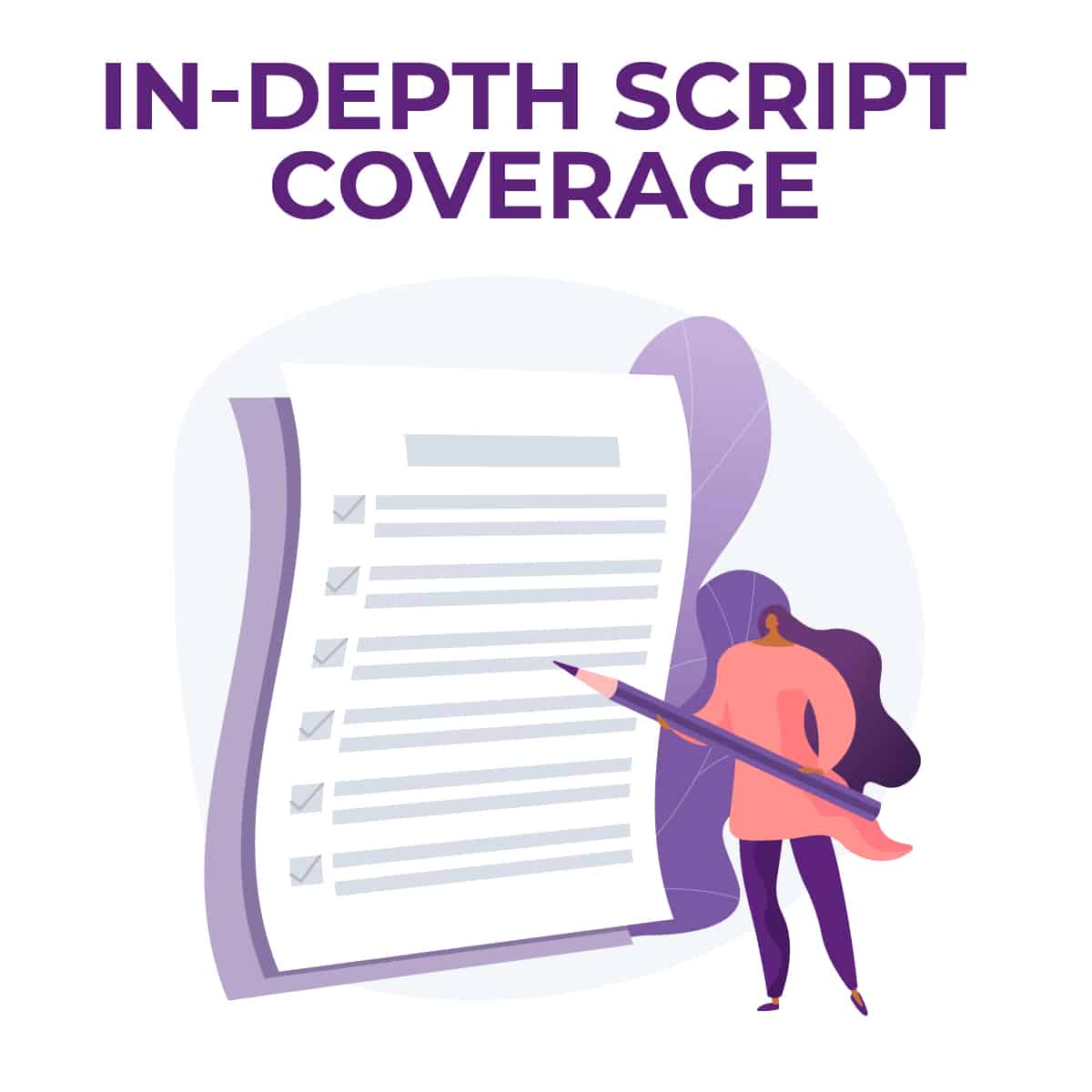

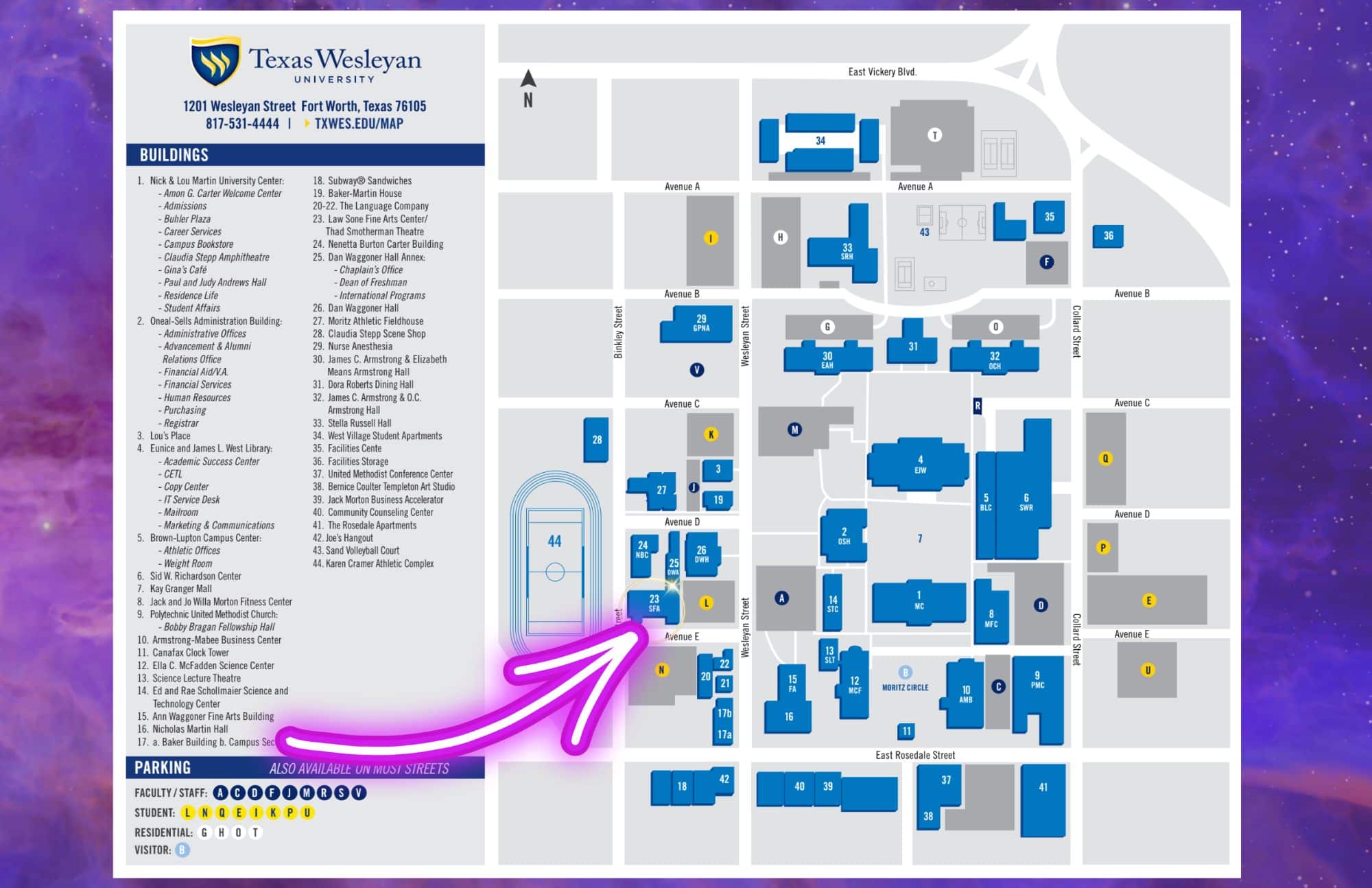
Please advise when you will have the next round of auditions for the next semesters workshops. I missed this first round and want to be sure I don’t miss the next.
Thank you
Andrea
Andrea, you’ll need to contact BMI for that information. Thanks!